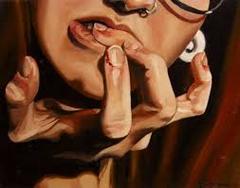 The crippling nature of anxiety can be experienced in extremes and in varying degrees and can make a person feel like they are going in all directions at once: Potentially then in no direction: I don't know why... but it hurts... I cannot do it... it's in my chest. No, I don't want to. This paralysis is usually marked by an inability to move past the psychological barriers that prompt the anxiety in the first place and the physiological experiences that manifest in a person's body secondarily. A person suffering from anxiety may not even recognize that there are psychological preconditions (i.e. thoughts, ideas, memories) prompting the physiological, bodily experience. These thoughts and memories will often time remain unconscious because the thought of remembering them is often more anxiety provoking than the actually anxiety experienced. That is the really tricky part because for all intents and purposes "anxiety" is a natural response to potential or actual life-threatening events and if you are not confronting the cause of the anxiety your mind/brain will naturally respond to the threatening events your mind is imagining and that you, at the time, are unable to acknowledge. THE PHYSIOLOGICAL DIRECTION: This mental event takes place primarily in two major brain structures, the amygdala and the hippocampus. Both of these structures are inner organs of the brain, that is they lie internally to the neocortex which is commonly recognized as the "grey matter" that folds around the internal organs and is the primary differentiating part of the human brain. The neocortex is the portion of the brain that allows for higher thought processing, e.g. when a person decides between going for a walk or staying at home to watch TV. This is not to say that the neocortex does not access other parts of the internal brain in making these decision. The amygdala is believed to be a major contributor to the processing of emotions, "do I want to go for a walk?" The hippocampus is thought to assist in the storing of memories that have emotional content, e.g. "the last time I was on a walk a rabid dog chased me for three blocks," or "it reminds me of my deceased mother. We used to take walks every week." Understanding the internal physiological components of anxiety is one direction a person can take to better understand the way the physical processes affect a person's anxiety. The amygdala has been shown in studies to be physically larger in children whom have identified traumatic early-life events. This is thought to potentially increase the individual's susceptibility to anxiety. Recognizing that there may be a strict physiological reason for a person to be more quickly triggered and for it to be less easily controlled can be stress reducing in itself. Psychopharmacological medications are another physiological direction that a person can take for affecting positive change when experiencing anxiety. By Mathew Quaschnick
1 Comment
Leave a Reply. |
UPTOWN THERAPY MPLSEdited and composed by Mathew Quaschnick
Sort articles by clicking below on ARCHIVES or CATEGORIES.
MENTAL HEALTH THERAPY
LOCATION AND HOURS:
1406 West Lake St. #204 Minneapolis, MN 55408
Monday - Friday: 9-5 PM with limited evening appointments
Archives
March 2017
Categories
All
|
|
Uptown Therapy is wonderful. I have benefited greatly these past 8 months and am sure to continue. |


 RSS Feed
RSS Feed
